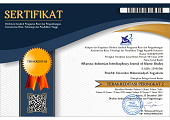Konsep Al-Ma’rifah dalam Tradisi Sufisme Dzu al-Nun al-Mishri
Abstract
Keywords
Full Text:
PDFReferences
Hamka. 1986. Tasawuf: Perkembangan dan Pemurniannya, Jakarta: Pustaka Panjimas.
Ismail, Asep Usman. 1997. ”Kimiawan yang Sufi”, Majalah Panji Masyarakat, No. 2 Tahun 1. 28 April.
al-Madani, al-Sayyid Abu Dhaif. 1973. Dzu al-Nun al-Mishri wa Adab al-Shufi, Beirut: Dar al-Syuruq.
Mahjuddin. 1991. Kuliah Akhlak Tasawuf, Jakata: Kalam Mulia.
Muzanni, Saeful (ed.). 1986. Islam Rasional: Gagasan dan Pemikiran Prof. Dr. Harun Nasution, Bandung: Mizan.
Nasr, Sayyid Husein. 1985. Tasauf: Dulu dan Sekarang (terj. Abdul Hadi WM),Jakarta: Pustaka Firdaus.
Nasution, Harun. 1993. Falsafat dan Mistisisme, Jakarta: Bulan Bintang.
PP Muhammadiyah. 2005. Manhaj Tarjih Muhammadiyah, Malang: Putusan Munas Tarjih Muhammadiyah XXV.
Schimmel, Annemarie. 1990. Mystical Dimensions of Islam, Chapel Hill: The Universityof North Caroline Press.
DOI: https://doi.org/10.18196/aiijis.2015.0042.29-40
Refbacks
- There are currently no refbacks.
Copyright (c) 2015 Afkaruna: Indonesian Interdisciplinary Journal of Islamic Studies

This work is licensed under a Creative Commons Attribution-ShareAlike 4.0 International License.
Afkaruna: Indonesian Interdiciplinary Journal of Islamic Studies indexed by:












1.png)


